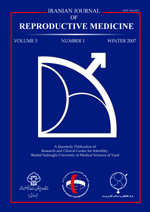
|
International Journal of Reproductive BioMedicine
Research and Clinical Center for Infertility, Shahid Sadoughi University of Medical Sciences of Yazd
ISSN: 1680-6433
EISSN: 1680-6433
Vol. 18, No. 2, 2020, pp. 121-128
|
 Bioline Code: rm20014
Bioline Code: rm20014
Full paper language: English
Document type: Short Communication
Document available free of charge
|
|
|
International Journal of Reproductive BioMedicine, Vol. 18, No. 2, 2020, pp. 121-128
| en |
Semen quality among men attending urology services in the Dschang Health District, west Cameroon: A retrospective study on 379 cases
Césaire Momo Tetsatsi, Aimé; Alumeti Munyali, Désiré; Romeo Bonsou Fozin, Georges; Ngadjui, Esther; Wankeu-Nya, Modeste & Watcho, Pierre
Abstract
Background: Infertility is a common condition affecting at least 15% of couples
worldwide, and male factors are involved in about half of this prevalence rate.
In Cameroon, about 20%-40% of couples are the victims. However, the sperm
characteristics of infertile men are yet to be described in the health districts in
Cameroon for better management of male infertility.
Objective: The present study was designed to assess the sperm profile and related
sociodemographic factors of men attending the urology services at the Dschang Health
District.
Materials and Methods: It consisted of a 10 yr retrospective study carried out in the
Dschang Health District. The results of patients’ semen analysis (SA) were computed
using Epi Info software and expressed as qualitative and quantitative spermogram state
as described by the clinician and sociodemographic features of those patients.
Results: Out of the 379 patients studied, 83.91% had abnormal spermogram. Patients
older than 50 yr were the most affected when grouped into age categories. With regard
to patient’s profession, 52.51% had specified their profession and from that group,
although farmers (9.31%) represented the lowest size category, they were the most
affected with 94.74% having abnormal spermogram.
Conclusion: This study indicates that the sperm damage is the major cause of male
infertility in the Dschang Health District. It also shows that farmers are the most affected
category and it could be linked to the long-term exposure to pesticides. These results
call for the assessment of the reproductive toxicity of locally used pesticides.
Keywords
Sperm damage; Male infertility; Semen analysis; Dschang Health District.
|
| |
© Copyright 2020 - Momo Tetsatsi et al.
Alternative site location: http://www.ijrm.ir
|
|
